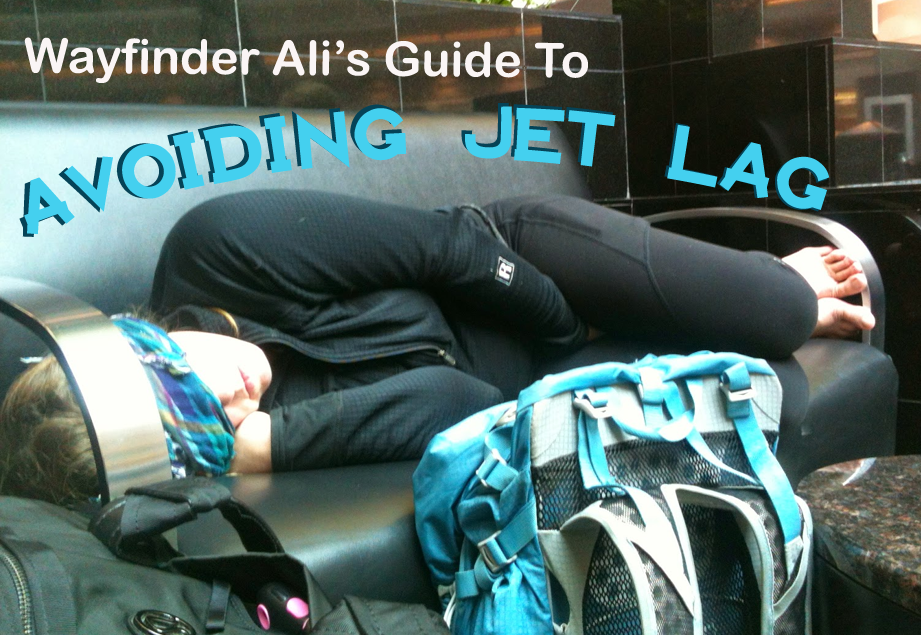I am a jet lag wizard. I manage to avoid jet lag without drugs or sleep aids. In December I flew home from Hong Kong to North Carolina- a 13 hour time difference with no jet lag.
 |
Catching some sleep in ATL after an all-nighter.
It may be 3pm in Georgia, but is midnight in my destination
|
Jet lag is the worst, especially if you're on vacation. You don't want to be exhausted while trying to enjoy your adventure, and then you definitely don't want to feel you have to "recover" from vacation once you get home and head back to work. For me, I have to avoid jet lag because I often have to work the first day I arrive in a new country. The first time I flew to the other side of the world, I really didn't even think about it until it happened. My first few days were so rough. I remember thinking "what's wrong with me?" while I desperately tried to stay awake at 3pm.
Now, I rarely experience jet-lag because I follow my jet lag protocol which includes altering eating drinking and sleeping habits only during travel.
My Anti-Jet Lag Protocol
Pre-Flight
I do not alter my sleep schedule days or weeks before my flight like some do. I begin preparation less than 12 hours before my flight. Depending on when my flight leaves, I will either stay up all night so that I am very sleepy when my flight leaves, or I wake up much earlier than I am accustomed to on the day of my flight. While I am at the airport, or while at home getting ready to leave I usually have a cup of coffee to help me focus and keep me from falling asleep before boarding.
 Our bodies are accustomed to fasting for an extended period of time- the part of the day when we typically sleep. If you sleep eight hours a night, your body is used to, and expects, to not eat during those hours. Eating a small meal or large snack every 3 to 4 hours confuses your metabolism and body clock. By eating during the time your body is usually fasting, you'll keep your metabolism going which helps your body clock re-set. I typically ask the flight attendant to wake me up if I am asleep when a meal is served. Some people prefer to fast while flying, but I am usually in transit for more than 24 hours and find I get too 'hangry' if I fast. I always keep a plethora of snacks in my carry-on so that I am not dependent on airlines to feed me.
Our bodies are accustomed to fasting for an extended period of time- the part of the day when we typically sleep. If you sleep eight hours a night, your body is used to, and expects, to not eat during those hours. Eating a small meal or large snack every 3 to 4 hours confuses your metabolism and body clock. By eating during the time your body is usually fasting, you'll keep your metabolism going which helps your body clock re-set. I typically ask the flight attendant to wake me up if I am asleep when a meal is served. Some people prefer to fast while flying, but I am usually in transit for more than 24 hours and find I get too 'hangry' if I fast. I always keep a plethora of snacks in my carry-on so that I am not dependent on airlines to feed me.Time Zones and Sleeping
As soon as I board and get settled, I set my phone to the time zone of my destination. I try to sleep as much as I can while it would be dark in my destination, and stay awake as much as I can while it is daytime in my destination. It is difficult to fight heavy eyelids, which is why I make sure I am sleepy for my flight by staying up all night the night prior. Know what the local time will be when you land and try to plan ahead while you fly. You want to be tired when you arrive and ready to sleep if landing in the evening, or try to be well rested if you arrive morning or mid-day.
Direct Flights vs Transfers I find its harder to avoid jet lag on a single 16 hour flight than on two flights of differing times. Transfers add to the over-all travel time, extending the time your body is "in transit" and give you more time to adjust. Transfers make me nervous if I have checked any luggage (which I try to avoid) but they make avoiding jet lag much easier.
 Sleeping Comfortably If you can afford it, upgrade to business class. I will probably never be able to pay for business class, so I do the best I can in Economy. I always make sure I have a good quality, highly compressible travel pillow, a scarf that doubles as a blanket, an eye mask and ear plugs. Also make sure to have lip balm and moisturizer for your face and skin. Planes are such dry places!
Sleeping Comfortably If you can afford it, upgrade to business class. I will probably never be able to pay for business class, so I do the best I can in Economy. I always make sure I have a good quality, highly compressible travel pillow, a scarf that doubles as a blanket, an eye mask and ear plugs. Also make sure to have lip balm and moisturizer for your face and skin. Planes are such dry places!
HUE 21 Lightweight Over-sized Scarf 19"x86" $16.99
Owl Bird Sleep Mask $9.99
Sea to Summit Aeros Premium Pillow $44.95
Burt's Bees Naturally Nourishing Lotion 2.5 oz $22
Burt's Bees Nourishing Mango Lip Balm $3.75
After You Land
What to avoid
 Sleeping Comfortably If you can afford it, upgrade to business class. I will probably never be able to pay for business class, so I do the best I can in Economy. I always make sure I have a good quality, highly compressible travel pillow, a scarf that doubles as a blanket, an eye mask and ear plugs. Also make sure to have lip balm and moisturizer for your face and skin. Planes are such dry places!
Sleeping Comfortably If you can afford it, upgrade to business class. I will probably never be able to pay for business class, so I do the best I can in Economy. I always make sure I have a good quality, highly compressible travel pillow, a scarf that doubles as a blanket, an eye mask and ear plugs. Also make sure to have lip balm and moisturizer for your face and skin. Planes are such dry places!HUE 21 Lightweight Over-sized Scarf 19"x86" $16.99
Owl Bird Sleep Mask $9.99
Sea to Summit Aeros Premium Pillow $44.95
Burt's Bees Naturally Nourishing Lotion 2.5 oz $22
Burt's Bees Nourishing Mango Lip Balm $3.75
After You Land
- Sunlight- Sunlight is so critical for our circadian rhythms. Make sure you leave your curtains open to let in sunlight. Even if you sleep through sunrise, the exposure to the light will help hasten the change to the new time zone
- Food- Make sure you're eating on your new time zone schedule, which means resisting late night snacks.
- Hydration- Jet lag and the entire flying process, can stress our bodies out. To ensure rapid recovery, make sure you're getting plenty of fluids
What to avoid
- Alcohol- Absolutely avoid alcohol, I know, total bummer. While it may make you sleepy, it will dehydrate you. Airplanes are already incredibly dry places where you are already very likely to become dehydrated. Dehydration leads to headaches and makes it harder for your body to function in every way, including digesting food and dealing with stress. (Jet lag = stress!) Alcohol also disrupts your REM cycle, so the sleep you do get on the plane will not be as restful.
- Sleep medications- Taking a sleeping aid may force you to sleep, but there are problems and potential dangers you may encounter from them. If you don't regularly take a sleep aid, and take one just for flying, you will probably be asleep longer than you normally would. Sleeping sitting upright for prolonged periods of time without getting up to move around can contribute to blood clots. They can also alter your consciousness and have side effects like sleep walking and talking. If you are sitting at the isle, passengers sitting next to you may not be able to wake you up when they need to go to the bathroom or stretch. I have often had to climb over the person next to me because he wouldn't wake up. I had trouble with Tony when he took one on a flight with me. When I tried to wake him up he would say the weirdest stuff and then fall asleep before moving. If you feel you absolutely must take something, try taking melatonin. It is the same chemical your body releases when you fall asleep.
- Coffee and Soda- I break these rules sometimes, because I love coffee, but really, you should avoid it when flying. Coffee, soda and caffeinated tea are diuretics. They encourage urination by forcing your body to excrete water which can dehydrated you. I suggest drinking a third to half a liter of water to accompany a cup of coffee.






